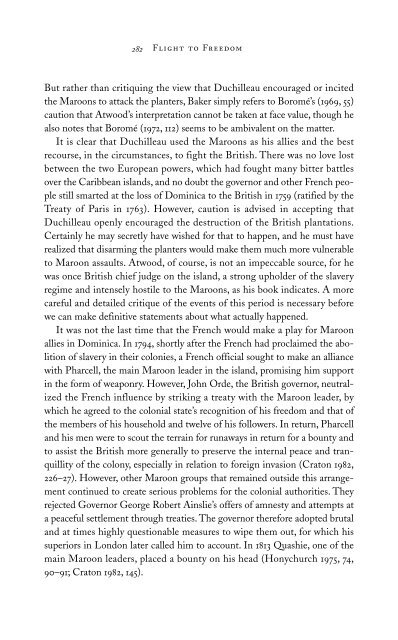60199616-flight-to-freedom-african-runaways-and-maroons-in-the-americas
60199616-flight-to-freedom-african-runaways-and-maroons-in-the-americas
60199616-flight-to-freedom-african-runaways-and-maroons-in-the-americas
Create successful ePaper yourself
Turn your PDF publications into a flip-book with our unique Google optimized e-Paper software.
282 Flight <strong>to</strong> Freedom<br />
But ra<strong>the</strong>r than critiqu<strong>in</strong>g <strong>the</strong> view that Duchilleau encouraged or <strong>in</strong>cited<br />
<strong>the</strong> Maroons <strong>to</strong> attack <strong>the</strong> planters, Baker simply refers <strong>to</strong> Boromé’s (1969, 55)<br />
caution that Atwood’s <strong>in</strong>terpretation cannot be taken at face value, though he<br />
also notes that Boromé (1972, 112) seems <strong>to</strong> be ambivalent on <strong>the</strong> matter.<br />
It is clear that Duchilleau used <strong>the</strong> Maroons as his allies <strong>and</strong> <strong>the</strong> best<br />
recourse, <strong>in</strong> <strong>the</strong> circumstances, <strong>to</strong> fight <strong>the</strong> British. There was no love lost<br />
between <strong>the</strong> two European powers, which had fought many bitter battles<br />
over <strong>the</strong> Caribbean isl<strong>and</strong>s, <strong>and</strong> no doubt <strong>the</strong> governor <strong>and</strong> o<strong>the</strong>r French people<br />
still smarted at <strong>the</strong> loss of Dom<strong>in</strong>ica <strong>to</strong> <strong>the</strong> British <strong>in</strong> 1759 (ratified by <strong>the</strong><br />
Treaty of Paris <strong>in</strong> 1763). However, caution is advised <strong>in</strong> accept<strong>in</strong>g that<br />
Duchilleau openly encouraged <strong>the</strong> destruction of <strong>the</strong> British plantations.<br />
Certa<strong>in</strong>ly he may secretly have wished for that <strong>to</strong> happen, <strong>and</strong> he must have<br />
realized that disarm<strong>in</strong>g <strong>the</strong> planters would make <strong>the</strong>m much more vulnerable<br />
<strong>to</strong> Maroon assaults. Atwood, of course, is not an impeccable source, for he<br />
was once British chief judge on <strong>the</strong> isl<strong>and</strong>, a strong upholder of <strong>the</strong> slavery<br />
regime <strong>and</strong> <strong>in</strong>tensely hostile <strong>to</strong> <strong>the</strong> Maroons, as his book <strong>in</strong>dicates. A more<br />
careful <strong>and</strong> detailed critique of <strong>the</strong> events of this period is necessary before<br />
we can make def<strong>in</strong>itive statements about what actually happened.<br />
It was not <strong>the</strong> last time that <strong>the</strong> French would make a play for Maroon<br />
allies <strong>in</strong> Dom<strong>in</strong>ica. In 1794, shortly after <strong>the</strong> French had proclaimed <strong>the</strong> abolition<br />
of slavery <strong>in</strong> <strong>the</strong>ir colonies, a French official sought <strong>to</strong> make an alliance<br />
with Pharcell, <strong>the</strong> ma<strong>in</strong> Maroon leader <strong>in</strong> <strong>the</strong> isl<strong>and</strong>, promis<strong>in</strong>g him support<br />
<strong>in</strong> <strong>the</strong> form of weaponry. However, John Orde, <strong>the</strong> British governor, neutralized<br />
<strong>the</strong> French <strong>in</strong>fluence by strik<strong>in</strong>g a treaty with <strong>the</strong> Maroon leader, by<br />
which he agreed <strong>to</strong> <strong>the</strong> colonial state’s recognition of his <strong>freedom</strong> <strong>and</strong> that of<br />
<strong>the</strong> members of his household <strong>and</strong> twelve of his followers. In return, Pharcell<br />
<strong>and</strong> his men were <strong>to</strong> scout <strong>the</strong> terra<strong>in</strong> for <strong>runaways</strong> <strong>in</strong> return for a bounty <strong>and</strong><br />
<strong>to</strong> assist <strong>the</strong> British more generally <strong>to</strong> preserve <strong>the</strong> <strong>in</strong>ternal peace <strong>and</strong> tranquillity<br />
of <strong>the</strong> colony, especially <strong>in</strong> relation <strong>to</strong> foreign <strong>in</strong>vasion (Cra<strong>to</strong>n 1982,<br />
226–27). However, o<strong>the</strong>r Maroon groups that rema<strong>in</strong>ed outside this arrangement<br />
cont<strong>in</strong>ued <strong>to</strong> create serious problems for <strong>the</strong> colonial authorities. They<br />
rejected Governor George Robert A<strong>in</strong>slie’s offers of amnesty <strong>and</strong> attempts at<br />
a peaceful settlement through treaties. The governor <strong>the</strong>refore adopted brutal<br />
<strong>and</strong> at times highly questionable measures <strong>to</strong> wipe <strong>the</strong>m out, for which his<br />
superiors <strong>in</strong> London later called him <strong>to</strong> account. In 1813 Quashie, one of <strong>the</strong><br />
ma<strong>in</strong> Maroon leaders, placed a bounty on his head (Honychurch 1975, 74,<br />
90–91; Cra<strong>to</strong>n 1982, 145).


